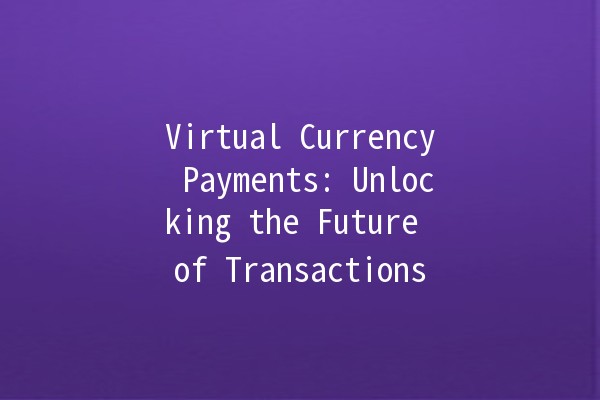




In recent years, the rise of virtual currencies has transformed the landscape of financial transactions. While many people are familiar with the term "Bitcoin," the field extends far beyond that. As digital currencies gain traction, understanding virtual currency payments is crucial for both consumers and businesses. This article explores the practical aspects of virtual currency payments, offering actionable tips to enhance your engagement in this innovative financial sphere.
Virtual currency has evolved significantly since the introduction of Bitcoin in

Decentralization: Unlike traditional currencies issued by governments, most virtual currencies are decentralized and based on blockchain technology, which ensures transparency and security.
Anonymity: Users can conduct transactions without revealing their identities, although transparency varies by currency.
Global Accessibility: Virtual currencies facilitate international payments without the need for intermediaries, making them accessible to anyone with an internet connection.
Integrating virtual currency payment options can provide several advantages for both businesses and consumers.
A digital wallet is essential for storing virtual currency. The choice between a hot wallet (connected to the internet) and a cold wallet (offline storage) depends on your security preferences and accessibility needs.
Tip: Use hardware wallets for longterm storage to minimize risks of hacking. If you require easy access for transactions, consider hot wallets offered by reputable exchanges.
The legal status of virtual currencies varies significantly across countries. Understanding the regulatory landscape is vital for compliance and avoiding potential legal pitfalls.
Tip: Regularly consult legal resources and follow updates from regulatory bodies to ensure your operations align with the latest regulations.
To streamline the acceptance of virtual currency payments, consider using established payment processors that offer userfriendly interfaces and secure transactions.
Tip: Popular processors like BitPay and CoinGate can help you accept various cryptocurrencies while converting them into fiat currency, mitigating volatility risks.
Introducing virtual currency payments can be daunting, especially for customers unfamiliar with the technology. Providing educational resources can enhance trust and encourage usage.
Tip: Create easytounderstand guides or FAQs on your website to explain how to use virtual currencies for payments. Consider webinars or workshops to engage directly with customers.
Regularly tracking your virtual currency transactions can provide insights into customer behavior and preferences, helping you refine your business strategies.
Tip: Use tools and analytics software that specialize in cryptocurrency transaction analysis to identify trends and improve service delivery.
Integrating virtual currency payments should not compromise user experience. Ensure that the payment process is as seamless as traditional methods to avoid losing potential customers.
Cryptocurrency prices can fluctuate dramatically, impacting both consumers and businesses. Implementing strategies to manage this volatility is crucial for operational stability.
Tip: Consider immediately converting received cryptocurrencies into fiat currency to avoid the risks associated with price swings.
Establishing a community around your business can foster loyalty and encourage discussion regarding your virtual currency offerings.
Tip: Utilize social media platforms and forums to engage users, share insights, and gather feedback on your virtual currency payment services.
A wide range of virtual currencies can be utilized for payments, with Bitcoin and Ethereum being the most popular. Many payment processors support several cryptocurrencies, allowing businesses to cater to a larger audience.
While virtual currency transactions benefit from encryption and decentralization, they are not entirely without risk. Using secure wallets, reputable exchanges, and payment processors can significantly reduce these risks.
Refunding virtual currency payments can be more complex than traditional methods due to price volatility. Establish clear refund policies considering the current exchange rate at the time of the refund.
Transaction fees can vary based on the currency and the network. Generally, they are lower than traditional banking fees, but they can increase during peak network usage.
Training sessions, online courses, and engaging with experts in the field can provide your team with a solid understanding of virtual currencies, enabling them to assist customers effectively.
Begin by selecting a reliable wallet and payment processor. After that, integrate the chosen solutions into your payment system, inform your customers, and monitor the transactions closely.
As virtual currency payments continue to gain momentum, businesses and consumers must stay informed about industry developments. Leveraging the benefits of this financial innovation can lead to improved efficiency, reduced costs, and enhanced security. By employing the tips provided and fostering a greater understanding of virtual currency payments, you can successfully navigate this evolving landscape and capitalize on the opportunities it presents.
, the future of transactions is undeniably intertwined with virtual currency. By integrating these innovative payment systems and continuously engaging with your audience, you can ensure that your business remains at the forefront of this financial revolution.